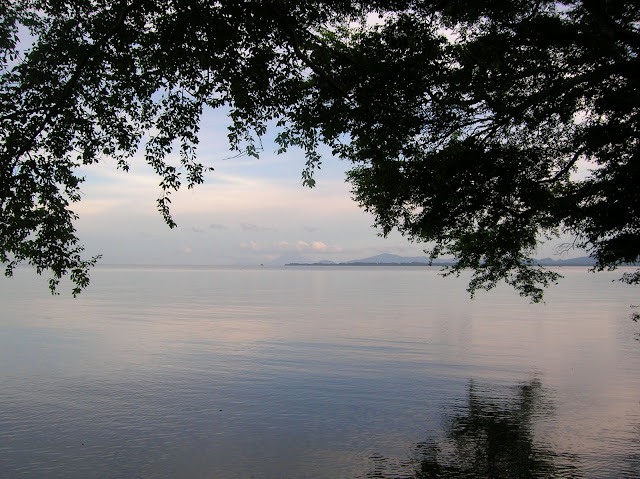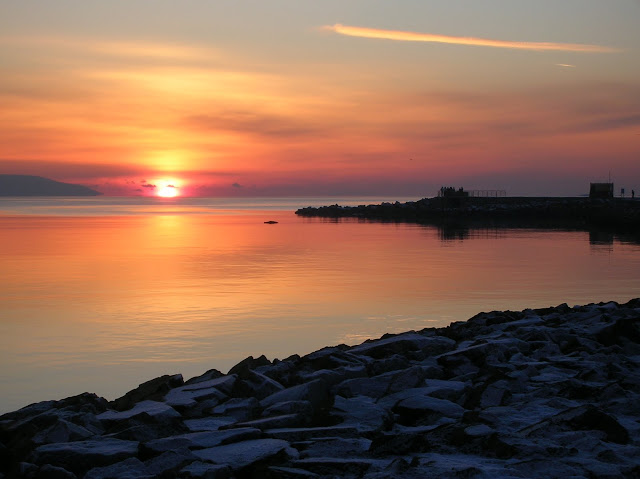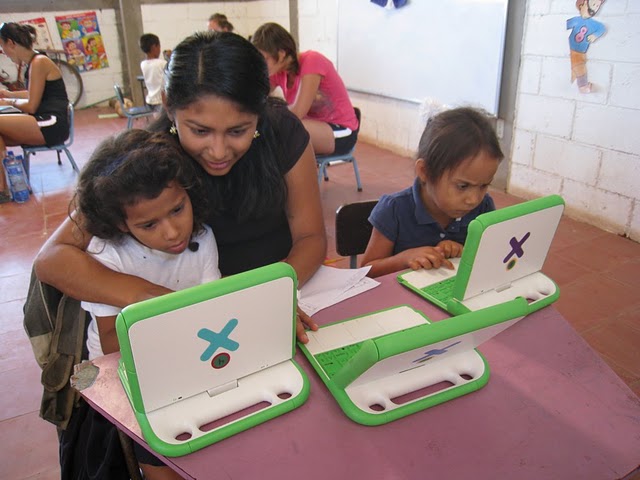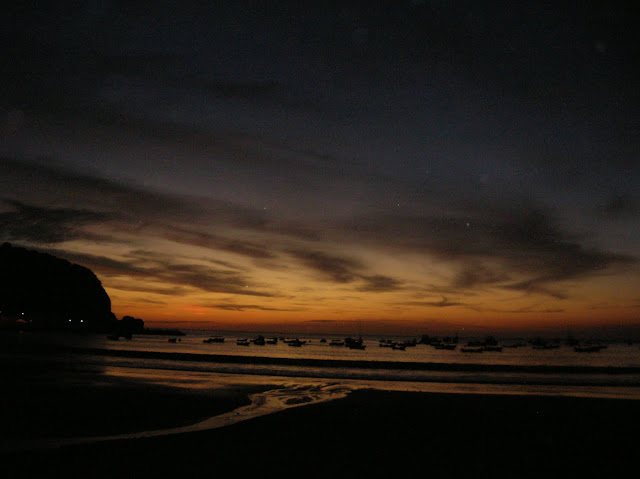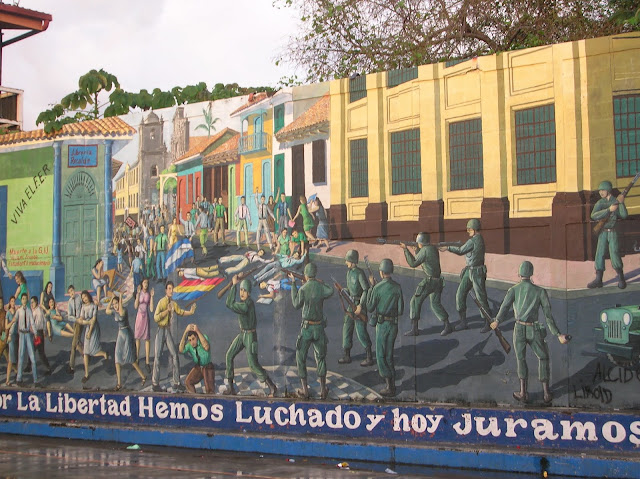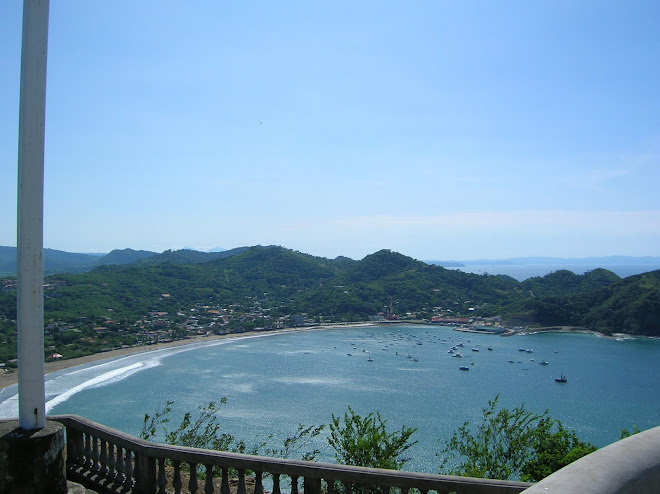After a week of almost endless partying in Valencia, it was time to get back on the road again and so I found myself travelling to Madrid by train, slightly the worse for wear after The Cult's gig the night before, on a gloriously sunny afternoon.
Suddenly, I was alone again, after four and a half weeks surrounded by new friends in San Seb, a week with Brid and her extended Spanish family in Peniscola, and another week in Cian and Marie's Valencian pad.
Suddenly, too, life was an open book again. I didn't have a return ticket to Ireland, all I knew was that I had four nights booked in a Madrid hotel, and everything seemed uncertain. And I loved that feeling!
Some people tell me they could never travel alone. For me, of course, it's always great to spend time with friends or family or loved ones, but there is a great feeling of freedom associated with getting on a bus or a train on your own, without knowing what's at the other end of the journey.
There is no pressure to drink or to party, you can have the quietest night in or walk ten miles through unfamiliar city streets according to a whim. While specific projects have been really important to my gap year (four months in Koh Lanta, becoming a Divemaster; four and a half weeks in San Sebastian, learning Spanish; and still to come, my volunteer project in Nicaragua) I haven't minded my times on my own.
I don't think I could travel endlessly for 12 months, wich is why I've tried to put down temporary roots in Koh Lanta, San Sebastian, and, in September, Granada, but life on the road challenges me in a way that sitting at home in my home town never could.
What I'm saying, I guess, is that we are all different, and yet we can all suffer from loneliness from time to time. But I know I could feel just as alone in a crowded late night bar in Galway on a Saturday night as I did pounding the streets of Madrid, not knowing a soul.
Anyway, I made my way across Madrid to book into my superb hotel, Antigua Posada Del Pez. Located in a quiet side street in Malasana, just five minutes from the action of Gran Via, it was a gem, with a spacious room, unbelievably quiet, and free wi-fi.
Malasana is a funny area, with lovely (and cheap) ethnic restaurants, alcoholics gathered round a square and 'ladies of the night' on street corners, within just minutes of Puerto del Sol and the tourist heart of the city.
Having unloaded my huge rucksack, I took a stroll around town, only to come across a free concert on the terrace of Teatro Royal, featuring Placido Domingo, who had earlier featured in an operatic show inside.
Standing beside him was the Queen of Spain, Sofia, whose arrival was greeted with ecstasy by the gathered hordes. I might not be much of a fan of the royals in any country, must be the Irish rebel in me, but my darling niece Sofia is called after this particular monarch and I was kicking myself that I'd left my camera back in the hotel.
Later the same night, an all female group from a college of music in Portugal treated a large crowd to a thrilling, free concert on Calle Arenal. Suddenly no longer feeling in any way alone, I was heartened to strike up a conversation with two women in their 70s who were bopping to the music at 1 a.m. Madrid really is a late night place.
The next few days were spent exploring the heart of the city on foot. It's amazing how much you can cover in four or five hours.
I spent five hours in the Museo del Prado, the highlight of which was Goya's massive anti-war murals depicting scenes from the Spanish uprising (against the French) two centuries ago.
The following day, I was equally enthralled by the Reina Sofia Museum, featuring photos from the deprived streets of New York in the 1980s, Picasso's massive 'Guernica', and a host of surrealist paintings by Dali and company. Madrid truly is one of the great cities of the world.
It was 37 degrees each day during my visit, but I didn't find the heat too repressive. Perhaps I've become accustomed to it after five months in South East Asia.
I found Madrid to be a friendly, lively place; and nothing like the place I'd conjured up in my mind from years of listening to tales of Basque repression. O.k., I will never cheer for Real Madrid, Franco's team, but as is so often the case, the perceived 'enemy' didn't seem to be so bad once I got to know them!
Friday, July 30, 2010
Monday, July 26, 2010
Bulls and bands in Valencia
Almost a week of total leisure at the Meditteranean resort of Peniscola, which is thankfully free of the British and Irish stereotypes, ended with a trip to Valencia to stay with Cian Campbell and his wife, Marie, who left the 'joys' of Ireland behind a year and a half ago.
With an apartment overlooking the city's 160 year old bullring, which itself is right next to the city's train station, it's fair to say that they've radically changed their lives since leaving Galway.
And, having missed the bullring in Pamplona by a matter of hours, there was no way this reporter was going to miss out on the summer festival literally yards from the terrace where we would sip a 'cerveza' in the evenings.
First, though, there was the matter of a gig by The Wailers to attend, Bob Marley's old band coming up with the goods in a huge open air venue, alongside the former riverbed.
Valencia endured massive flooding back in the 1950s, and as a result the city authorities decided to divert the river away from the centre, ensuring a 9km long park, Jardines del Turia, for its citizens.
The Wailers, who I last saw playing to a couple of hundred in the Roisin Dubh, did a good job to get the Spaniards grooving on a Monday night and I met some of Cian and Marie's lovely circle of new friends, including Bergonia from San Sebastian, who was full of enthusiasm as she asked about my time in her native city.
Afternoons were spent exploring the city, including the Cathedral which is said to host the original Holy Grail and also boasts a bell-tower with spectacular views, once you've mastered the 207 steps.
Wednesday night was bullfight night, featuring local star Enrique Ponce. It was amazing to see the passion of the crowd, the skill of the matadors and, espeically, their horses, but the whole thing left me cold. A century ago, Hemingway was enraptured by this sport, but let's just say that the modern version is a bit more sanitised, and to modern Irish eyes, simply cruel to the bulls.
It's not a fair fight and my feeling that this was a culture in decline, or at least under threat, was intensified later in the week when there was a large protest outside the entrance to the ring.
But the stadium itself is impressive, even if I left thinking that the village festival in Igea is better fun. Up there, they tease and fool with the bulls, but they don't hurt them and allow them to leave the ring unharmed. In Valencia, all of the bulls, even the very bravest, were slaughtered.
On Friday, we got to sample the delights of a flamenco show, in a bar outside town which is frequented by more locals than tourists. It was a rousing show, full of passion and no little skill.
But for me the highlight of the week was a return to the park to see The Cult belt out all their old favourites (Rain, She Sells Sanctuary, Nirvana, The Witch, Spiritwalker) etc to a manic crowd. I made my way up to the very front, where I befriended about half the local loons. It was great fun.
Sometimes you need the Spanish to remind you that there is no harm in growing old disgracefully. Here, it doesn't matter if you are 30 or 40 or 50 if you want to stay out until the early hours and have fun. There is still a 'joy for life' in Spain which the Irish seem to have forgotten in all the greed of the Celtic Tiger years, and the despair which has followed the 'crisis'.
I love the Spanish work ethic. Entire businesses shut down for the month of August, because holidays are important to them, more important perhaps than making money during the peak tourist season.
And that's why I liked Valencia. The place has a lovely long beach, but no mass of English pubs selling 'full' breakfasts or fish and chips. Tourists have not over-run the place, but that's why the locals love it.
It's Spain's third city and does not have the confidence or brashness of Madrid or Barcelona. But it has a warmth and a passion which will linger in the memory ... even if I was very lucky that one of my favourite bands from the late 1980s also happened to be in town.
I took the train to Madrid on the afternoon of the Galway versus Tipperary hurling game and it seemed somehow appropriate that I was missing an event which would have been so central to my life for so many years.
A gap year is about change, about trying new things and seeing new people, and somehow it seemed right to be moshing up the front at a post-punk concert instead of hitting for Dublin for another tale of Galway heartbreak at Croke Park.
With an apartment overlooking the city's 160 year old bullring, which itself is right next to the city's train station, it's fair to say that they've radically changed their lives since leaving Galway.
And, having missed the bullring in Pamplona by a matter of hours, there was no way this reporter was going to miss out on the summer festival literally yards from the terrace where we would sip a 'cerveza' in the evenings.
First, though, there was the matter of a gig by The Wailers to attend, Bob Marley's old band coming up with the goods in a huge open air venue, alongside the former riverbed.
Valencia endured massive flooding back in the 1950s, and as a result the city authorities decided to divert the river away from the centre, ensuring a 9km long park, Jardines del Turia, for its citizens.
The Wailers, who I last saw playing to a couple of hundred in the Roisin Dubh, did a good job to get the Spaniards grooving on a Monday night and I met some of Cian and Marie's lovely circle of new friends, including Bergonia from San Sebastian, who was full of enthusiasm as she asked about my time in her native city.
Afternoons were spent exploring the city, including the Cathedral which is said to host the original Holy Grail and also boasts a bell-tower with spectacular views, once you've mastered the 207 steps.
Wednesday night was bullfight night, featuring local star Enrique Ponce. It was amazing to see the passion of the crowd, the skill of the matadors and, espeically, their horses, but the whole thing left me cold. A century ago, Hemingway was enraptured by this sport, but let's just say that the modern version is a bit more sanitised, and to modern Irish eyes, simply cruel to the bulls.
It's not a fair fight and my feeling that this was a culture in decline, or at least under threat, was intensified later in the week when there was a large protest outside the entrance to the ring.
But the stadium itself is impressive, even if I left thinking that the village festival in Igea is better fun. Up there, they tease and fool with the bulls, but they don't hurt them and allow them to leave the ring unharmed. In Valencia, all of the bulls, even the very bravest, were slaughtered.
On Friday, we got to sample the delights of a flamenco show, in a bar outside town which is frequented by more locals than tourists. It was a rousing show, full of passion and no little skill.
But for me the highlight of the week was a return to the park to see The Cult belt out all their old favourites (Rain, She Sells Sanctuary, Nirvana, The Witch, Spiritwalker) etc to a manic crowd. I made my way up to the very front, where I befriended about half the local loons. It was great fun.
Sometimes you need the Spanish to remind you that there is no harm in growing old disgracefully. Here, it doesn't matter if you are 30 or 40 or 50 if you want to stay out until the early hours and have fun. There is still a 'joy for life' in Spain which the Irish seem to have forgotten in all the greed of the Celtic Tiger years, and the despair which has followed the 'crisis'.
I love the Spanish work ethic. Entire businesses shut down for the month of August, because holidays are important to them, more important perhaps than making money during the peak tourist season.
And that's why I liked Valencia. The place has a lovely long beach, but no mass of English pubs selling 'full' breakfasts or fish and chips. Tourists have not over-run the place, but that's why the locals love it.
It's Spain's third city and does not have the confidence or brashness of Madrid or Barcelona. But it has a warmth and a passion which will linger in the memory ... even if I was very lucky that one of my favourite bands from the late 1980s also happened to be in town.
I took the train to Madrid on the afternoon of the Galway versus Tipperary hurling game and it seemed somehow appropriate that I was missing an event which would have been so central to my life for so many years.
A gap year is about change, about trying new things and seeing new people, and somehow it seemed right to be moshing up the front at a post-punk concert instead of hitting for Dublin for another tale of Galway heartbreak at Croke Park.
Monday, July 12, 2010
Farewell to San Sebastian
And so, on the morning after the World Cup triumph, it was time to bid farewell to the beautiful city of San Sebastian which had been my home for the past four and a half weeks.
In some ways I was sad to say goodbye, and the first bit of drizzle in three weeks reflected my mood as I boarded the train to Barcelona for the next stage of my 12 month adventure.
Last night, Sunday, was the first time I saw anybody celebrate Spain's remarkable progress through the World Cup, and to judge by quite a few locals in the Auld Dubliner, not everyone was pleased when Iniesta fired home the game's only goal against Holland.
In an instant, the Barcelona man became a national legend. But many of the Basques, blinded by tribal hatred, could only see disaster in the victory of the despised national team.
In the Old Town, earlier in the day, huge posters had gone up to remind tourists that this was not Spain. Yes, for many people, supporting La Roja is an act of treason and there were few red shirts to be seen down around La Concha beach throughout the day.
It must be really weird for the local hero, Xabi Alonso, to play for a 'national' side which is despised by many of his neighbours . . .
But, suddenly, in the minutes after the game, the mood changed. People took to their cars, horns beeping, to celebrate ... even if the celebrations lacked the intensity you'd find elsewhere in the country.
Anyway, I had a brilliant last night in one of my favourite European cities. I had met my cousin Ian, his wife Isobel, and their 18 month old son Arthur for lunch, vino, and a swim in the sea in the afternoon and hooked up with half a dozen new friends in the pub for the game.
Ian could not believe how few Spanish flags there were around the city. In fact, there were far more blue and white banners of Real Sociedad, who won promotion to La Liga a month earlier.
The atmosphere was good in the Aul Dubliner, owned by Margaret and her Basque partner, even if some Basques wore Dutch colours and some of those in red were from Ireland or England.
Soon it was time to bid farewell to lovely Norwegian couple Cigi and Christian, Scottish teacher Mellisa, fellow Galwegian Eoin, and veteran English teacher Jon, whose insights into Basque life were intriguing over the four weeks since I first met him, watching a game.
I was not a bit sad to say goodbye to my psychotic house-mate who had criticised me endlessly over the four weeks and even decided to clear out my room, putting all my personal belongings into bags, on the Sunday afternoon.
I complained to the school, twice, and I'm sure I will enjoy telling tales in the future about her obsessions and compulsions.
Let's just say that she didn't like buying things for the house (such as toilet paper), didn't like the way I closed the window in my room, or showered, or dried after a shower, or left powder in the washing machine, or bottles in the fridge, and never made me feel at home.
She would lie in her room with the door open on the nights when I dared to 'corner' the TV and, no, I don't think it was a little late invitation!
I've complained to the school about this person's attitude to foreign students, twice in fact, and at least the whole experience has made me appreciate just how laid back most of us Irish are when it comes to sharing places.
In fairness, the staff at the school were very understanding. They offered to rehouse me as soon as I raised my concerns and were appalled by the litany of petty incidents I reported to them.
As for the school itself, I think my Spanish came on immensely over the month and two of my teachers, Rosa and Naroa, were simply superb. My classes were sociable but hard-working, challenging, and extremely practical, and it's a pity my whole experience with Lacunza was soured by having to share a flat with an impossible woman over the four and a half weeks.
But, what the hell, I had three weeks of glorious weather and got to snorkel in La Concha Bay. I met some fantastic people and I'm sure I will see the funny side of my horrible experience in the Egia flat in a week or two, once I get over the pettiness of it all.
All I can say to my friends and family, and anybody else who happens across this blog, is to get yourself to San Sebastian for a week or so some time in May, June, or September. It really is a gem of a place.
The city is blessed with the best bay in any European city, brilliant night life, delicious pintxos, scenic walks, narrow streets you can get lost in, and just a fantastic vibe, and jest for life. That's probably why I've been back there about five times in the space of four years!
In some ways I was sad to say goodbye, and the first bit of drizzle in three weeks reflected my mood as I boarded the train to Barcelona for the next stage of my 12 month adventure.
Last night, Sunday, was the first time I saw anybody celebrate Spain's remarkable progress through the World Cup, and to judge by quite a few locals in the Auld Dubliner, not everyone was pleased when Iniesta fired home the game's only goal against Holland.
In an instant, the Barcelona man became a national legend. But many of the Basques, blinded by tribal hatred, could only see disaster in the victory of the despised national team.
In the Old Town, earlier in the day, huge posters had gone up to remind tourists that this was not Spain. Yes, for many people, supporting La Roja is an act of treason and there were few red shirts to be seen down around La Concha beach throughout the day.
It must be really weird for the local hero, Xabi Alonso, to play for a 'national' side which is despised by many of his neighbours . . .
But, suddenly, in the minutes after the game, the mood changed. People took to their cars, horns beeping, to celebrate ... even if the celebrations lacked the intensity you'd find elsewhere in the country.
Anyway, I had a brilliant last night in one of my favourite European cities. I had met my cousin Ian, his wife Isobel, and their 18 month old son Arthur for lunch, vino, and a swim in the sea in the afternoon and hooked up with half a dozen new friends in the pub for the game.
Ian could not believe how few Spanish flags there were around the city. In fact, there were far more blue and white banners of Real Sociedad, who won promotion to La Liga a month earlier.
The atmosphere was good in the Aul Dubliner, owned by Margaret and her Basque partner, even if some Basques wore Dutch colours and some of those in red were from Ireland or England.
Soon it was time to bid farewell to lovely Norwegian couple Cigi and Christian, Scottish teacher Mellisa, fellow Galwegian Eoin, and veteran English teacher Jon, whose insights into Basque life were intriguing over the four weeks since I first met him, watching a game.
I was not a bit sad to say goodbye to my psychotic house-mate who had criticised me endlessly over the four weeks and even decided to clear out my room, putting all my personal belongings into bags, on the Sunday afternoon.
I complained to the school, twice, and I'm sure I will enjoy telling tales in the future about her obsessions and compulsions.
Let's just say that she didn't like buying things for the house (such as toilet paper), didn't like the way I closed the window in my room, or showered, or dried after a shower, or left powder in the washing machine, or bottles in the fridge, and never made me feel at home.
She would lie in her room with the door open on the nights when I dared to 'corner' the TV and, no, I don't think it was a little late invitation!
I've complained to the school about this person's attitude to foreign students, twice in fact, and at least the whole experience has made me appreciate just how laid back most of us Irish are when it comes to sharing places.
In fairness, the staff at the school were very understanding. They offered to rehouse me as soon as I raised my concerns and were appalled by the litany of petty incidents I reported to them.
As for the school itself, I think my Spanish came on immensely over the month and two of my teachers, Rosa and Naroa, were simply superb. My classes were sociable but hard-working, challenging, and extremely practical, and it's a pity my whole experience with Lacunza was soured by having to share a flat with an impossible woman over the four and a half weeks.
But, what the hell, I had three weeks of glorious weather and got to snorkel in La Concha Bay. I met some fantastic people and I'm sure I will see the funny side of my horrible experience in the Egia flat in a week or two, once I get over the pettiness of it all.
All I can say to my friends and family, and anybody else who happens across this blog, is to get yourself to San Sebastian for a week or so some time in May, June, or September. It really is a gem of a place.
The city is blessed with the best bay in any European city, brilliant night life, delicious pintxos, scenic walks, narrow streets you can get lost in, and just a fantastic vibe, and jest for life. That's probably why I've been back there about five times in the space of four years!
Friday, July 9, 2010
Bizzare to be in Basque land!
Well, my four weeks of studying Spanish in the Basque Country have come to an end. It has been an incredible experience, with three weeks of glorious weather and instant friendships made with students from all over Europe as we enjoy nights out on the tiles.
It´s also been pretty bizarre to be here for the World Cup, because I could count on one hand the number of Spanish jerseys I have seen around San Sebastian over the past month. And most of them belonged to tourists!
Nobody admits to supporting ´their´national team and I even saw a violent bottle fight between a group of locals and some ´pissed up´tourists in the heart of the Old Town on the night of the excellent victory over Germany.
"This is not Spain," roared a woman in her mid 40s from outside an ETA supporting pub, as she launched a glass missile at a first floor window. The Americans and Australians inside, full of the joys after a day in Pamplona, probably hadn´t a clue what she was on about.
Basically, Basques do not support their national team, even though local boy Xabi Alonso is one of its stars. There is no wild beeping of horns, no flags being flown from lamp posts or balconies, and all soccer loyalties are reserved for Real Sociedad.
The fun over the past few weeks came from the ethnic supporters, the immigrants such as the Argentinians who made the Auld Dubliner pub their home. They chanted, they brandished flags, they wore the shirts, and they made this Irish supporter wish they had gone all the way to the final.
But there are people here from all over the world at this time of year and I also found a pub full of Dutchies who were jusifiably proud of their side on the afternoon of the quarter final. The streets tend to fill with fans from Holland, Brazil, Uruguay, or wherever, after the games, but you won´t see any fans of Espana dancing in the fountains. It´s strange, especially when you see how much the national team has captured the hearts of people in other parts of Spain.
Around here, all the attention at the moment is on the San Fermins festival, 45 minutes down the road in Pamplona. The morning bull runs through the heart of the city are the stuff of legends, and no few accidents, and a cause for celebrations in which people´s loyalties don´t come under question.
It´s strange to be in a country which feels it´s not part of a country, if you know what I mean. The first flag which greets boats on their arrival into the port of San Sebastian is the red and green flag of the Basque Country, what I call "the Mayo Union Jack".
National flags are not even visible over Government buildings and all of the discussions over whether or not people should support Spain have brought out the latent Socioligist in me.
For an Irish person, it´s fascination. The question of the Basques is in many ways similar to that of the Irish, even if there are also a host of differences.
But it´s sad to see people in their 40s or 50s, full of hatred and despair, hurling bottles at windows because they can´t accept that people want to enjoy a celebration.
In other parts of Spain, the team´s wonderful run to the final has lifted the national mood, but here it has just opened up wounds about what it means to be a Basque and whether that is compatible with supporring the red shirts of Espana.
Anyway, the plan is to enjoy the final in the Auld Dubliner, before heading south to see Brid and Manolo, Sofia, and Cian and Marie over the coming weeks in Peniscola and Valencia. Sure beats covering the Arts Festival.
And, yes, the past few weeks have made me realise how far our own piece of rock in the North Atlantic has come. I met a young student here who told me he was from Co. Londonderry, which pretty much set out his tribal loyalties from the start.
Thankfully, these days, our two tribes are not killing each other any more. Ireland has left the dark days behind, but some Basques seem to be intent on holding on to the hatreds of the past.
In our country, we´ve learned that such bitterness takes time to clear, that wounds are not easily healed, but we´ve come a long way. But right here, right now, I would not like to parade around town in a red Spanish team shirt on Sunday night, even if in the comfort of their own homes many locals will be rooting for the national side.
It´s also been pretty bizarre to be here for the World Cup, because I could count on one hand the number of Spanish jerseys I have seen around San Sebastian over the past month. And most of them belonged to tourists!
Nobody admits to supporting ´their´national team and I even saw a violent bottle fight between a group of locals and some ´pissed up´tourists in the heart of the Old Town on the night of the excellent victory over Germany.
"This is not Spain," roared a woman in her mid 40s from outside an ETA supporting pub, as she launched a glass missile at a first floor window. The Americans and Australians inside, full of the joys after a day in Pamplona, probably hadn´t a clue what she was on about.
Basically, Basques do not support their national team, even though local boy Xabi Alonso is one of its stars. There is no wild beeping of horns, no flags being flown from lamp posts or balconies, and all soccer loyalties are reserved for Real Sociedad.
The fun over the past few weeks came from the ethnic supporters, the immigrants such as the Argentinians who made the Auld Dubliner pub their home. They chanted, they brandished flags, they wore the shirts, and they made this Irish supporter wish they had gone all the way to the final.
But there are people here from all over the world at this time of year and I also found a pub full of Dutchies who were jusifiably proud of their side on the afternoon of the quarter final. The streets tend to fill with fans from Holland, Brazil, Uruguay, or wherever, after the games, but you won´t see any fans of Espana dancing in the fountains. It´s strange, especially when you see how much the national team has captured the hearts of people in other parts of Spain.
Around here, all the attention at the moment is on the San Fermins festival, 45 minutes down the road in Pamplona. The morning bull runs through the heart of the city are the stuff of legends, and no few accidents, and a cause for celebrations in which people´s loyalties don´t come under question.
It´s strange to be in a country which feels it´s not part of a country, if you know what I mean. The first flag which greets boats on their arrival into the port of San Sebastian is the red and green flag of the Basque Country, what I call "the Mayo Union Jack".
National flags are not even visible over Government buildings and all of the discussions over whether or not people should support Spain have brought out the latent Socioligist in me.
For an Irish person, it´s fascination. The question of the Basques is in many ways similar to that of the Irish, even if there are also a host of differences.
But it´s sad to see people in their 40s or 50s, full of hatred and despair, hurling bottles at windows because they can´t accept that people want to enjoy a celebration.
In other parts of Spain, the team´s wonderful run to the final has lifted the national mood, but here it has just opened up wounds about what it means to be a Basque and whether that is compatible with supporring the red shirts of Espana.
Anyway, the plan is to enjoy the final in the Auld Dubliner, before heading south to see Brid and Manolo, Sofia, and Cian and Marie over the coming weeks in Peniscola and Valencia. Sure beats covering the Arts Festival.
And, yes, the past few weeks have made me realise how far our own piece of rock in the North Atlantic has come. I met a young student here who told me he was from Co. Londonderry, which pretty much set out his tribal loyalties from the start.
Thankfully, these days, our two tribes are not killing each other any more. Ireland has left the dark days behind, but some Basques seem to be intent on holding on to the hatreds of the past.
In our country, we´ve learned that such bitterness takes time to clear, that wounds are not easily healed, but we´ve come a long way. But right here, right now, I would not like to parade around town in a red Spanish team shirt on Sunday night, even if in the comfort of their own homes many locals will be rooting for the national side.
Subscribe to:
Posts (Atom)
